实用英语英语第一册
实用大学英语第一册_教案
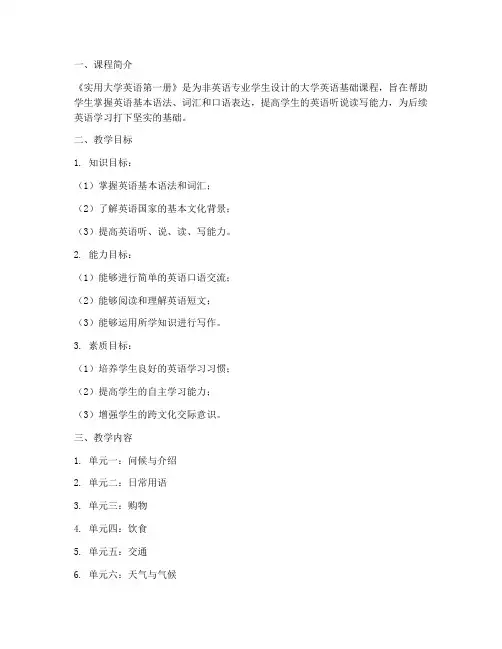
一、课程简介《实用大学英语第一册》是为非英语专业学生设计的大学英语基础课程,旨在帮助学生掌握英语基本语法、词汇和口语表达,提高学生的英语听说读写能力,为后续英语学习打下坚实的基础。
二、教学目标1. 知识目标:(1)掌握英语基本语法和词汇;(2)了解英语国家的基本文化背景;(3)提高英语听、说、读、写能力。
2. 能力目标:(1)能够进行简单的英语口语交流;(2)能够阅读和理解英语短文;(3)能够运用所学知识进行写作。
3. 素质目标:(1)培养学生良好的英语学习习惯;(2)提高学生的自主学习能力;(3)增强学生的跨文化交际意识。
三、教学内容1. 单元一:问候与介绍2. 单元二:日常用语3. 单元三:购物4. 单元四:饮食5. 单元五:交通6. 单元六:天气与气候7. 单元七:工作与职业8. 单元八:娱乐与休闲9. 单元九:旅行10. 单元十:家庭与朋友四、教学方法1. 讲授法:教师讲解英语语法、词汇和口语表达,帮助学生掌握基础知识;2. 演示法:教师通过实际操作演示,让学生直观地了解英语口语和写作技巧;3. 讨论法:鼓励学生积极参与课堂讨论,提高学生的口语表达能力;4. 案例分析法:结合实际生活案例,让学生了解英语国家文化背景;5. 角色扮演法:通过模拟真实场景,让学生在实际语境中运用所学知识。
五、教学进度安排1. 第一周:导入课程,介绍课程内容、教学目标和方法;2. 第二至四周:学习单元一至三,重点掌握问候、介绍和日常用语;3. 第五至七周:学习单元四至六,重点掌握购物、饮食和天气与气候;4. 第八至十周:学习单元七至十,重点掌握工作与职业、娱乐与休闲、旅行和家庭与朋友;5. 第十一周:进行期中考试,检验学生的学习成果;6. 第十二至十三周:复习巩固所学知识,进行期末考试。
六、教学评价1. 课堂表现:包括出勤、课堂发言、参与讨论等;2. 作业完成情况:包括课堂作业、课后作业等;3. 考试成绩:包括期中考试、期末考试等;4. 学生自评:学生对自己的学习情况进行自我评价。
实用英语第一册unit4课后答案
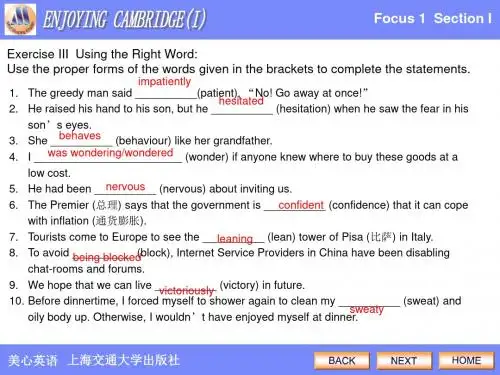
a. The kid __w_e_n_t__ into his room and shut the door. b. She tried to blow out all the candles on the cake in one __g_o_. (3) rest n. & vi. a. You may take a __r_e_s_t __ after that class. b. I see a bird __r_e_st_in_g_ on the roof. (4) drink n. & vt. a. Are there any soft _d_r_in_k_s__ in the refrigerator? b. She __d_r_in_k_s_ milk before going to bed every night. (5) feel n. & vi. a. I _a_m_ not __fe_e_l_in_g_ well now, so I can’t dine out with you. b. The _______ of the meeting is tense.
美心英语 上海交通大学出版社
Focus 1 Section I
Exercise VII.1 Translation: Translate the following sentences into Chinese. (1) She’s been dating him for months but she’s still not very serious. 她__跟_他__约__会__几__个_月__了__,__但__她__还_不__是__很__认__真_。____ (2) Tom came close to falling off the high wall. 汤__姆__差__点__从_高__墙__上__跌__下__来_。________________ (3) He goes for the world record. _他__想_创__造__世__界__纪_录__。______________________ (4) The magician escaped from the cage with his hands tied behind his back. _魔__术_师__双__手__反__绑_着__从__笼__子__里__逃_了__出__来__。_______ (5) She must have had a cold, for she had a fever and a runny nose. 她__一__定__是__感_冒__了__,__因__为__她_发__烧__,__还__流_鼻__涕__。____
《新编大学实用英语英语教程》(林立总主编)第一册教案

教案课程名称大学英语1教案书写规范与要求一、以每次课为一个备课单元书写。
二、每一备课单元书写下列内容:1.周次、课次、授课时间、章节名称;2.简要说明:教学目的、重点、难点、教学方法和授课手段(包括与课程相关的上机和实验、课件制作等);3.教学主要内容(教案主体)及教学方法手段;4.作业内容。
注:其余授课电子版文件待本课程结束后,交教务处统一刻成光盘存档。
大学英语1 课程授课总体计划书厦门软件职业技术学院教案厦门软件职业技术学院教案厦门软件职业技术学院教案厦门软件职业技术学院教案5 We are surprised at his great __improvement__(improve) in English.Activity 5 Fill in the blanks with the proper form of the words and phrases given in the box.1We got tired of his _endless_ boring speech.2 _Chatting_with friends is a good way of relaxation.3 Our country is rich in natural_resources__.4 Upon arrival,the singer are surrounded by a lot of fans and reporters.5 Tom _spends a lot of time in playing computer games every day.6To my surprise,only a third of the students in my class are interested in skiing.7He seems so quiet,but _actually he likes talking.8These days all the college students are very busy,especially the seniors.9 I sent her a bunch of flowers as a (an) expression of gratitude.10 Our college offers an excellent art program .Step II Grammar代词(Pronouns)一代词的分类二代词的用法1 人称代词注意:(1)人称代词在比较分句中作主语,用主格;作宾语,用宾格,如:She works harder than I (do).她比我用功。
实用英语综合教程第1册教案
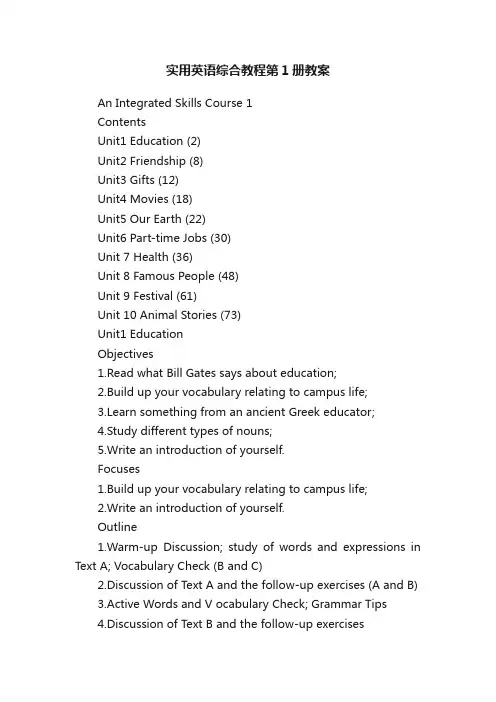
实用英语综合教程第1册教案An Integrated Skills Course 1ContentsUnit1 Education (2)Unit2 Friendship (8)Unit3 Gifts (12)Unit4 Movies (18)Unit5 Our Earth (22)Unit6 Part-time Jobs (30)Unit 7 Health (36)Unit 8 Famous People (48)Unit 9 Festival (61)Unit 10 Animal Stories (73)Unit1 EducationObjectives1.Read what Bill Gates says about education;2.Build up your vocabulary relating to campus life;3.Learn something from an ancient Greek educator;4.Study different types of nouns;5.Write an introduction of yourself.Focuses1.Build up your vocabulary relating to campus life;2.Write an introduction of yourself.Outline1.Warm-up Discussion; study of words and expressions in Text A; Vocabulary Check (B and C)2.Discussion of Text A and the follow-up exercises (A and B)3.Active Words and V ocabulary Check; Grammar Tips4.Discussion of Text B and the follow-up exercises/doc/5040d052e87101f69e31955e.html prehensive Exercises (Ask the students to do the translation exercises outside of theclass beforehand)6.Practical WritingProcedures:Classroom ActivitiesI. Warm-up discussionQuestion: Do you know anything about Bill Gates such as his life and his educational background?Hint1)birthday and birthplace: October 28, 1995; Seattle, Washington2)educational background: Harvard University (education not completed)3)career: chairmen and chief software architect of Microsoft, the word‘s largest and most profitable software company.4)main events in his life:a.beginning programming computers at age 13;b.developing a version of the programming language BASIC for the first microcomputer in Harvard;c.founding Microsoft Corporation in 1975 at the age of 19II. Vocabulary in Text A1. education n.教育e.g. Children in poor areas receive free education.educate v.教育;教导educated adj.受教育的e.g. a well-educated maneducator n.教育家,教育者2. count v.派用场,点数e.g. 1) Every seconds counts.2) What counts more is whether you have tried your best.3) to count from 1 to 1004) Count these apples.3. advantage n.有利条件,好处;优点,优势e.g. This product has many advantages.advantageous adj.有利的,有益的,便利的e.g. It is highly advantageous to us.Phrase: take advantage of 很好的使用;利用e.g. take advantage of all educational opportunitiesAntonym: disadvantage n.不利;不利条件e.g. His bad health is a great disadvantage to him when he looks for work.4. lifetime n.一生,终生e.g. 1) a lifetime guarantee2)lifetime membership3) In my father‘s lifetime there have been many changes in the village.5. part-time adj.& adv.兼职的(地)e.g. 1)a part-time job2)He works part-time.full-time adj.全职的e.g. a full-time housewife6. programmer n.程序师,编程员program v.编制程序e.g. Please program the computer to do the job instead of doing it manually(手工操作).7. discourage vt. 不鼓励;使泄气,使失去信心e.g. His parents discouraged him from joining the air force.discouraged adj. 泄气的,失去信心的discouraging adj.使人泄气的,使人失去信心的e.g. 1) If you meet difficulty in your study, don‘t be discouraged.2) It is discouraging that I didn‘t k now how to solve the problem.Antonym: encourage vt.鼓励e.g. I encouraged her to work hard and to try to pass the examinations.courage n. 勇敢,勇气e.g. David showed great courage when he saved the child from the burning house.8. diploma n. 文凭,毕业证书e.g. a college diplomadiplomatic adj. 外交的,从事外交的e.g. Julia joined the diplomatic service after her graduation from university.9. project n.项目,课题e.g. 1) an impossible project2) The professor is directing a research project.Synonym: plan10. highly adv. 高度地;非常e.g. 1) a highly interesting story2) a highly paid jobPhrase: speak/ think highly of 赞扬,对…给予很高评价e.g. The leader speaks / thinks highly of our work.11. focus v.(使)集中;(使)聚焦e.g. 1) to focus (one‘s mind) in work2) All eyes focused on the speaker.focus n.(兴趣活动等的)中心,焦点e.g. Because of his strange clothes, he immediately becamethe focus of attention when heentered the office.12. range n. 范围e.g. You have a wide range of choices.range vi.在某范围内变化e.g. The temperature ranges from 10 to 20 degrees.13. attend v.参加,出席e.g. attend schoolattend a lectureattendance n.出席,到场14. automatically adv.自动地e.g. the machine operates automatically.automatic adj.自动的e.g. We have an automatic washing machine.15. drop out of 退学,不参与,退出e.g. 1) He dropped out of school at the age of 10 because his family was too poor to afford thetuition.2) She decided to drop out of the competition because it was not fire.16. chance of a lifetime 千载难逢的良机,一生中唯一的机会e.g. It‘s the chance of a lifetime. You will regret it the rest of your lif e if you don‘t take it.17. try out 试验,考验e.g. She bought a cookbook and tried out a few new recipes.18. in short 简而言之,总之e.g. In short, you should study hard for a better future.Synonym: in brief/ to sum up/ all in all/ in conclusionIII. Language Points in Text A1.They want to know what to study, or whether it?s Ok todrop out of college since that?s what I did.what to study: This is a wh-word + infinitive structure used as the object, which can be changed into an object clause. Wh-word + infinitive structure can be used as a subject, an object, or an appositive clause(同位语从句),for example:1)How to improve their English is often discussed among the students.2)We haven‘t decided when to visit the place.3)You haven‘t answered my question about wher e to get these books.it?s Ok to drop out of college: Here ―it‖ is used as a formal subject, and the actual subject is the infinitive structure ―to drop out of college‖. The general pattern is ―It is + adj. + (for/ of + sb.) todo sth.‖ More examples:1)It was very thoughtful of her to come to see me when I was ill.2)It‘s easy for me to see through his trick.that?s what I did: ―what I did‖ here is a predictive clause (表语从句)introduced by ―what‖. It is always structured in the form of ―subject + be/ look/ remain/ seem + predictive clause‖ and can be introduced by such words as ―that‖ (always omitted), and other wh-words, for example:1) It seems (that) it is going to rain.2) This is why I refused to attend the meeting.2. As I?ve said before, nobody should drop out of college unless they believe they face the chance of a lifetime.As I?ve said before: This is a non-restrictive relative clause(非限制性关系从句) introduced by ―as‖(正如…的那样), which can be placed at the beginning or at the end of the sentence. Moreexamples:1) As people expected, she was admitted to Beijing University.2) Hundreds of people were killed in the earthquake, as I have learned from the newspaper. unless: is a conjunction for an adverbial clause of condition (条件状语从句), which equals ―if…not…‖(除非).e.g. I won‘t leave unless the rain stops.3. In my company?s early years, we have a bright part-time programmer who planned to drop out of high school to work.planned to: intend to do sth.计划、打算做某事e.g. I plan to make a trip to Beijing during the summer vocation.who planned to …work: a restrictive relative clause introduced by ―who‖ since its antecedent is a person and serves as the subject in the clause. The relative pronoun ―that‖ can be used here too. More examples:1) The young man who sits there quietly is my brother.2) I don‘t like people that pry into others‘ private business.4. Having a diploma certainly helps somebody who is looking to us for a job.look to sb./ sth.: to depend on sb. or sth. for help or advice 指望,依赖e.g. We look to you for support.5. High school and college offer you the best chance to learn many things and to do projects with others that teach you about team spirit.that teach you about team spirit: This is a restrictive relative clause introduced by ―that‖, whose antecede nt acts as the subject of the clause. Actually the relative clause introduced by ―that‖ can be used to modify both the person or the thing,and the roll of ―that‖ can be either the subject or the object.e.g. He was the only one that I knew there.I haven‘t been to the place that you have mentioned.6. In high school there was a time when I was highly focused on writing software, but for most of my high school years I had many interests.when …software: This is a relative clause introduced by the relative a dverb ―when‖, which acts as the adverbial of time in the clause.e.g. 1) There was a time when I completely lost my self-confidence.2) I will never forget those days when we were together.7. For me, classroom is not the only place where you can learn.where you can learn: This is a restrictive relative clause introduced by the relative adverb ―where‖, which is used as the adverbial of place in the clause.e.g. 1) Do you still remember the restaurant where we had dinner last night?2) This is the place where he stayed his whole life.8. In short, it?s a real mistake not to take the chance to studya wide range of subjects and to learn to work with other people because education does count.it?s a real mistake not to take the chance: This is an example of a negative infinitive structure, where ―not‖ is placed before an infinitive.e.g. 1) We are asked not to speak loudly in class.2) It is a good idea not to go out on such a rainy day.IV. Focus on Grammar名词(Noun )一、名词的概念表示人、事物或抽象概念的词叫做名词。
实用英语第一册教案.doc
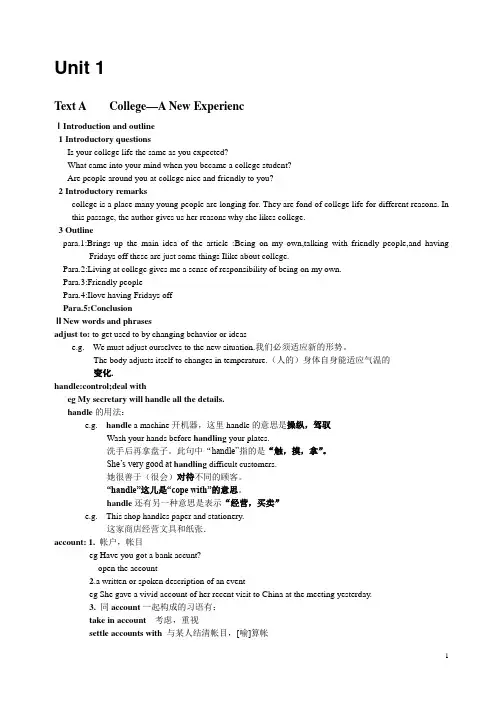
Unit 1Text A College—A New ExperiencⅠIntroduction and outline1 Introductory questionsIs your college life the same as you expected?What came into your mind when you became a college student?Are people around you at college nice and friendly to you?2 Introductory remarkscollege is a place many young people are longing for. They are fond of college life for different reasons. In this passage, the author gives us her reasons why she likes college.3 Outlinepara.1:Brings up the main idea of the article :Being on my own,talking with friendly people,and having Fridays off these are just some things Ilike about college.Para.2:Living at college gives me a sense of responsibility of being on my own.Para.3:Friendly peoplePara.4:Ilove having Fridays offPara.5:ConclusionⅡNew words and phrasesadjust to: to get used to by changing behavior or idease.g. We must adjust ourselves to the new situation.我们必须适应新的形势。
新编实用英语第一册教案
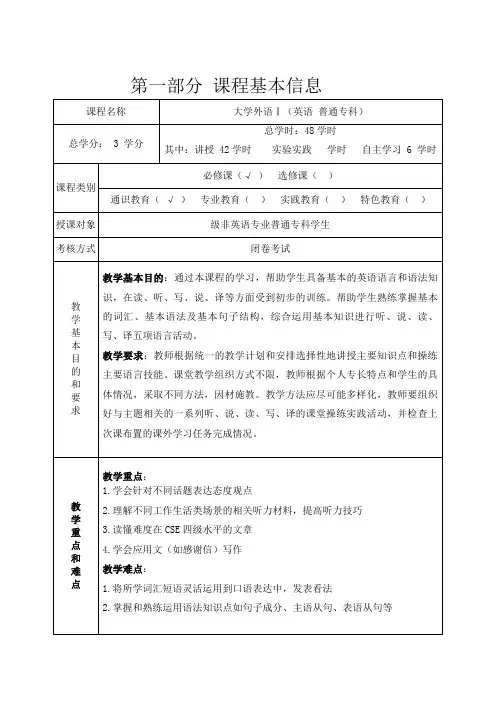
第一部分课程基本信息第二部分教学设计一、课程与教材分析(一)课程分析《大学英语》是高等教育的一个有机组成部分,是大学生的一门必修的基础课程。
大学英语教学是以英语语言知识与应用技能、学习策略和跨文化交际为主要内容;以外语教学理论为指导,并集多种教学模式和教学手段为一体的教学体系,旨在培养学生英语综合应用能力,特别是听说能力,使他们在今后工作和社会交往中能用英语有效地进行口头和书面的信息交流,同时增强其自主学习能力、提高综合文化素养,以适应我国经济发展和国际交流的需要。
(二)教材分析(突出针对课程需要,合理选择教材和教参)《新编实用英语》(第五版)系列教材国家“十三五”规划教材,是严格按照国家职业教育目标和要求精心设计的立体化公共外语教材,教材内容贴合日常交际和职场需求,在主题类别、语篇类型、语言知识、文化知识等方面均与《新课标》紧密对应,历经多年教学实践,得到了广大高职高专院校师生的充分认可。
教材立足“立德树人”根本教育任务,探索外语“课程思政”建设,注重中华优秀文化的表达,助力培养德才兼备、德智体美劳全面发展的人;注重培养学生的英语学科核心素养,助力学生形成关键能力和必备品格以及形成正确的世界观、人生观和价值观,努力将大英教材的思想价值渗透作用最大化,以美育人、以德润人,以文化人,潜移默化中引导学生坚定“四个自信”,润物无声中实现“育人育才”。
教材聚焦典型生活和职业场景,以富有生活化、职业性和时代性的选材,将英语技能放在职业场景中操练,注重对学生英语基本功和职业技能的全面培养,并创设“线上+ 线下”混合式外语教学生态,资源以立体化、多模态形式呈现,是比较适合我校学生实际的教材。
二、学生情况分析(一)学生基本情况本课程是面向我校非英语专业普通专科学生的公共必修课,所教大部分学生有较强的学习积极性、主动性和自觉性,具备比较基本的英语阅读和简单写作的能力,但是听力水平普遍较低,词汇量相对有限,在写作和翻译方面能力较为欠缺。
《新编实用英语》第一册
五、可做适当修改
本电子教案只给出了部分较难的练习答案, 但并不意味着就不做其它练习题。使用者可根据 各自的课时情况、学生的英语水平等因素自行确 定做练习的内容和方法,并可对本电子教案进行 修改,以满足个性化教学的需要。 由于制作这种形式的电子教案是一次全新的尝 试,本电子教案还存在着一定的不足和缺陷。欢 迎广大教师在使用的过程中提出宝贵意见,使其 不断改进和完善。
制
负 责 人:刘 然
作
人
பைடு நூலகம்
员
技术指导: 胡俊宇 制 作 人: 辛会元、刘 岩、于 轶、冯 威 金品卓、曹艳春、曹东波、杨欣瑶
制作单位:沈阳工程学院
高等教育出版社 高等教育电子音像出版社
四、教师在课堂上的作用
教师在课堂上的角色不只是英语知识的传授者, 更应该是培养学生进行语言交际能力的训练者,也 就是互动课堂活动的设计者和组织者。教师决不能 仅仅成为电子教案的演示者。因而,需要教师组织 学生对电子教案中的每个画面进行各种形式的练习。 例 如 : 当 电 子 教 案 中 出 现 “ Practice the following sentences.” 时,可以就所给出的例句 进行反复朗读、英/汉互译、背诵、或听写等练习。
《新编实用英语》第1册(第二版) 电子教案使用说明
一、本电子教案的特点
本电子教案完全是根据教师参考书中“参考
教案”的内容来制作的。其最大的特点是:1)
使用简单、方便,完全按照教师授课的时间和 步骤来制作。2)突出课堂教学活动的设计和 指导,有利于培养学生的语言应用能力。
二、与教科书的关系
电子教案是教师在课堂上授课的辅助工具,它不 能代替教科书。因而,在使用本电子教案时,必须 与教科书一起使用。例如:当电子教案中出现 “Reading of the Passage”界面时,就需要教师 指导学生采用多种方式朗读教材中的课文。又如: 当出现“ Read the printed materials in Listen and Decode in ONE minute.”界面时,就应在教材 中找到相对应的内容进行阅读。
新编实用英语第一册对话
第一册Unit One Hello, Hi!Work in pairs. Practice the following mini-talks about greeting and introducing people.1) Meeting People for the First TimeA: Hello, Mr. David Green! I'm Lily Zhang.B: Hi, Miss Zhang! Nice to meet you.A: Nice to meet you, too. Mr. Green.B: Oh, please call me David.2) Exchanging Business CardsA: How do you do, Prof. White? Glad to meet you.B: How do you do, Prof. Wang? Glad to meet you, too.A: Here is my business card.B: Thanks. This is mine.3) Introducing FriendsA: May I introduce my friend Lily? She is from Class One.B: Oh, hello, Lily. I'm Jack from Class Two.C: Nice to meet you.B: Nice to meet you, too.4) Meeting People AgainA: Hello, Professor Waters. How are you these days?B: Fine, thanks. And you?A: I'm fine, too.5) Saying GoodbyeA: Thank you for the nice party, Mrs. Lin. We really had avery good time.B: I'm glad you enjoyed it.A: Thanks for inviting me.B: Thanks for coming.Unit Two Saying Thanks or Sorry1) Giving Thanks to PeopleA: Thank you for the happy time.B: It's nice to have you with us.A: I shall never forget this weekend.B: Me, too. It was / has been so pleasant.2) Congratulating People on Winning a PrizeA: Congratulations on winning the first prize!B: Thank you very much.A: We all feel very proud of you.B: Thanks. Let's go and have a drink.3) Expressing Thanks for Others' HelpA: Professor Smith, thank you very much for your adviceon my paper!B: It's my pleasure to be of some help.A: I could never be so successful without your help.B: I always know that you can do well.4) Making Apologies to OthersA: I'm so sorry for being late again.B: Never mind, but it's a lesson for you to learn.A: Please forgive me one more time.B: Oh, just see it doesn't happen again, will you?5) Expressing RegretA: I'm sorry I didn't send the e-mail yesterday.B: Forget it. That's OK.A: I wish I could make up for it.B: I don't think it's your fault.Unit4 Punctuality and Culture 1) Asking for an Appointment with the ManagerA: I'd like to make an appointment with your manager. Do you think I could see him sometime this morning?B: Sorry, he's fully booked this morning.A: How about tomorrow morning then?B: Yes, I think tomorrow morning would be fine.2) Asking to Meet Mr. PetersonA: Mr. Peterson, I wonder if it would be convenient to meet you today.B: Let me see. I'm free this afternoon. Is that all right for you? A: Well, I've got a meeting from 2 to 4. Are you free tomorrow morning?B: No problem. Let's make it at 10 then.3) Asking to Change the Appointment with Dr. JohnsonA: I'd like to change the appointment with Dr. Johnson from Tuesday to Thursday.B: I'm afraid he won't be available on Thursday morning.A: What time would be convenient for him? Will 2 p.m. do?B: Yes, that'll be fine.4) Asking About the Working Hours of a Ticket OfficeA: What are the office hours?B: Well, the office hours are from 9 a.m. to 6 p.m.A: Do you work on weekends?B: On Saturday the office is open from 9 a.m. to 3 p.m., but on Sunday we are closed.5) Asking About the Flights for MacaoA: Do you have flights to Macao?B: We have only one flight to Macao each week, at 1:40 p.m. Wednesday.A: When does it arrive in Macao?B: At 3:40 p.m.Unit fiveMini-talks1)Which Table to Choose?Jane: Waiter, a table for two, please.Waiter: This way, please. Is this table alright?Jane: I would prefer the one near the window.Waiter: Sorry, it was reserved an hour ago. How about that one?Jane: That’s ok. Thank you.2)What do You Recommend?Waiter: What would you like to have?Zhou: I know nothing about American food here. What do you recommend? Waiter: What do you prefer, meat or fish?Zhou: I’d rather have meat.3)I’d Like Something Typically Chinese.Waiter: Hello, Madam. May I help you?Jenny: Yes. I’d like something typically Chinese.Waiter: Fine. We serve a wide range of typical Chinese food. Here’s the menu. Jenny: Good. I’d like to try so me Shanghai cuisine.4)May I Have a Bit More of This Wine?Zhang: May I have a bit more of this wine?Steven: Sure. Let me pour it for you. Say when.Zhang: Thank you. That’s enough.Steven: Ok. Help yourself to more meat if you want.5)Let Me Pay the Bill/Check.Li Ming: Let me pay the bill today.Tom: Oh, no! Let’s go Dutch. We’re both students after all.Li Ming: Ok. It’s 15 dollars altogether. So 7 dollars and 50 cents each. Right? Tom: That’s right. Waiter, bring the bill.第一册Unit 61) Talking About a Sports Event PosterA: Look at the poster!B: Oh, there will be a fun sports meet in our school.A: Sunday morning, in the stadium.B: And everybody is welcome!2) Suggesting Taking Part in a Sports EventA: Are you going to join the swimming contest? Youare a good swimmer.B: A swimming contest?A: There is a poster of a swimming contest at the schoolgate.B: Great! I'll go and check the details.3) Inviting One to an Outdoor ActivityA: Our students' union will hold a cycling race this weekendaround the city.B: Cycling? I love it.A: Would you like to come with us?B: Sure.4) Talking About a Sports Event with a FriendA: You know, the City Inter-college Basketball Championshipwill be held in our university this May.B: Yes, I've seen posters almost everywhere on campus.A: I am eager to watch the game.B: Me, too. I can hardly wait.5) Commenting on an Outdoor ActivityA: The 3rd International Walking Festival is drawing near.B: Yes, there are posters everywhere around the city.A: Walking is a healthy outdoor activity.B: And we can relax both our mind and our body.第一册Unit Seven Holiday Celebrations1) Talking About Giving or Going to PartiesA: The Students' Union is organizing a dancing party for us.B: Really? When and where will the party be held?A: It's at 7:30 p.m., January 1.B: On New Year's Day? That must be wonderful!2) Telling a Foreign Friend How You Observe Father's DayA: Do you observe Father's Day in China?B: Yes. More and more people have begun to celebrate it.A: So what gift have you prepared for your dad?B: Look at the fishing tackle. I'll go fishing with my dad.3) Inquiring About a Christmas PartyA: When and where is the Christmas Party being held?B: It's going to be at the College Hall on Christmas Eve.A: I'd like to learn more about English holidays at the party.B: And if you become a member of the student club, you can also make more friends.4) Discussing the Poster of a School Team Basketball MatchA: What is on the poster there? It looks so nice.B: Let's have a look. Oh, there is going to be a basketball match.A: Wonderful. Is it between school teams?B: Yes, Xinhua Technical college vs. Wuzhou Professional College. 5) Introducing a Chinese FestivalA: Is there any typical Chinese festival you celebrate?B: Yes, there are many. The Dragon Boat Festival is one of them.A: What special activities do you have during the festival?B: Dragon boat races are popular and we also eat delicious Zongzi.第一册unit 81) Complaining of One’s Illness to a DoctorA: Oh, doctor, I feel so terrible!B: Let’s see. What seems to be the problem?A: My whole body hurts.B: Perhaps you’ve got a cold. Take this medicine.2)Asking About Taking a MedicineA: How shall I take the medicine?B: Two pills a time, three times a day.A: Before or after meals?B: After meals.3)Showing Concern for a FriendA: What’s the matter/trouble with you?B: I’ve got a bad heada che.A: Have you seen a doctor?B: Yeah. He asked me to have a good rest.4)Giving Medical AdviceA: You’ve got another bad tooth.B: Well, I often have very bad toothaches.A: You should have dental checks more often.B: Yeah. But I just hate to see the dental drill.5)Giving a PrescriptionA: What’s wrong with you?B: I couldn’t sleep well.A: Let me prescribe the BEST medicine for you!B: I know what you’ll say. You want me to do more exercise.。
实用英语第一册教案.doc
Unit 1Text A College—A New ExperiencⅠIntroduction and outline1 Introductory questionsIs your college life the same as you expected?What came into your mind when you became a college student?Are people around you at college nice and friendly to you?2 Introductory remarkscollege is a place many young people are longing for. They are fond of college life for different reasons. In this passage, the author gives us her reasons why she likes college.3 Outlinepara.1:Brings up the main idea of the article :Being on my own,talking with friendly people,and having Fridays off these are just some things Ilike about college.Para.2:Living at college gives me a sense of responsibility of being on my own.Para.3:Friendly peoplePara.4:Ilove having Fridays offPara.5:ConclusionⅡNew words and phrasesadjust to: to get used to by changing behavior or idease.g. We must adjust ourselves to the new situation.我们必须适应新的形势。
《新编实用英语》第一册教案
《新编实⽤英语》第⼀册教案《新编实⽤英语》第⼀册教案Unit OneGreeting and Introducing PeopleTeaching ObjectiveIn "Talking Face to Face",learn how to greet people and how to make introductions.In "Being All Ears", practice listening comprehension to greet and introduce people with various relationships.In "Maintaining a Sharp Eye",master the key words and structures and learn the way foreign people greet each other, particularly the way Americans meet and greet each other, both in informal and formal situations by reading through passage I; learn and practice how to introduce oneself by reading through passage II.In "Trying Your Hand", become knowledgeable on how to write a business card and fill in a passport with one’s personal information; review the basic sentence structure. Teaching ProceduresSection I Talking Face to Face1.Warm- up:Expressions of greetings and responses to greetings:a. Greetings:1) Hi! How do you do?2) Hello, you must be Jack from America.3) How are you?4) Hello. How are things with you? How are you doing?5) How is everything?6) You are doing all right?7) How it goes?8) How is life, John?9) Excuse me. Are you Kitty?b. Responses to Greetings:1) How do you do?2) Fine, just fine.3) Fine, thank you.4) Quite well. And you?5) The usual. How about you?6) So-so. And what about you?7) Nothing particular.8) Not too bad.9) Nice to meet you.10) Very happy to see you.2.Introduction of the samples of business cards and passport3. Practice the two dialogues in Follow the Samples4. Practice dialogues according to the given tasks5. ExercisesSection II Being All EarsSee the textbook.Section III Maintaining a Sharp EyePassage I The Way Americans GreetText-Related Information1. GreetingThe simplest thing to say is "Good morning," "Good afternoon'" or "good evening." This greeting is given to one whom you know only slightly, or to any one you are passing quickly. "How are you" is usually used when you are not in such a hurry. No answer is expected other than "Fine, thank you." "Hello" is the commonest form of greeting between good friends.2. When to Shake HandsIt is customary to shake hands when you first meet someone. And usually friends shake hands when they meet after not having seen each other for some time. However it is not necessary to shake hands.3. Common Titles in Englisha. Mr.:“先⽣”a courtesy title for any male adult not styled “Sir”, “Dr.” etc. used before the man’s family name or his position.b. Mrs.:“太太”a courtesy title for any married woman not styled “lady”, “Dr.”etc. used before her husband‘s surname.c. Ms.: “⼥⼠” a courtesy title for a woman, whether she is married or not, followed by the family name.d. Miss: “⼩姐”A title used to address an unmarried woman or a girl. It is followed by the family name. Miss can also be used as the title of address to an (esp. unknown) unmarried woman. In this case, it is not followed by the name.e. Lady: “夫⼈、太太、⼥⼠”a courtesy title for a woman with dignity or social grace. It is also an English title for the wife of a knight or a baronet.f. Dr. (Doctor): “医⽣、博⼠”the title of a medical practitioner or the title of the holder of the highest university degree. e.g. Doctor of Philosophy (PhD).g. Prof. (Professor):“教授”The title to address a university teacher of the highest rank in a faculty.h. Officer: “官员,警察先⽣” The title to address a person holding a publicappointment, aposition of responsibility and trust, such as a policeman or a customs officer.i. Sir: “先⽣、长官、爵⼠”A form of polite address to a man; A title preceding the first name of a knight (爵⼠) or a baronet (准男爵); A form of address in writing to a stranger or in business letters.4. Formation of Common English NamesA common English name is usually composed of two or three parts: the first name is also called forename. If the person is a Christian, his first name will be given at his baptism, so it is also called the given name or the Christian name. Middle name is the second given name. When written, middle name is often shortened to the initial letter. Surname is often the father‘s family name, so it is also called family name or last name. For example: Anne Louise Strong, George B. Show.Text ExplanationPara. 1Americans often greet each other simply with “Hello”or “Hi”. They believe such an informal greeting often implies a close and friendly relationship. Similarly, Americans do not have a formal “farewell”. They will just wave “good-bye” to the whole group. Or perhaps, they will simply say “Bye”, “So long” or “Speaking of time, I’ve got to run” and then leave. To Americans, a friendly and informal relationship is themost important thing.Language Points:1.Explanation of Difficult Sentences1) The Way Americans GreetAnalysis: In this title, in which is omitted after The way.“in ... way”means (to do something) by means of a certain method. Translation: 美国⼈的致意⽅式Example: I think the way she runs her bookshop is worth studying.2)Speaking of ... time, I’ve got to run.Analysis: A present participle clause used as an adverbial of cause/time. It means “when it comes to time, I’m reminded of …”Translation: 说到时间,我得赶紧跑了。
- 1、下载文档前请自行甄别文档内容的完整性,平台不提供额外的编辑、内容补充、找答案等附加服务。
- 2、"仅部分预览"的文档,不可在线预览部分如存在完整性等问题,可反馈申请退款(可完整预览的文档不适用该条件!)。
- 3、如文档侵犯您的权益,请联系客服反馈,我们会尽快为您处理(人工客服工作时间:9:00-18:30)。
14
♦ considering prep. 鉴于,考虑到 鉴于,
Considering his poor health, I’m afraid he is unable to undertake the heavy task. ♦ considerate a. 体贴的,替人着想的 体贴的, It is said that Mary is a considerate girl. ♦ considered a. 深思熟虑的 Three days later he made a considered decision. ♦ considerable a. 相当大的,相当多的 相当大的, His hard work earned him a considerable amount of money.
6
♦ -ence/-ance:
confident --- confidence (信心 信心) 信心 depend --- dependence --- independence The nation gained ____ only five years ago. (depend) independence Have ____ in yourself, and you’ll be more likely to win the contest. (confident) confidence
13
♦feasible adj. 可行的 Can you think of a feasible plan to settle the problem? 你能想出一个可行的计划来解决这个问 题吗? 题吗? ♦latter adj. 后面的,后者的 后面的, Both Tom and Bob are leaving. The former is going to Beijing and the latter is returning to his hometown.
实用英语第二册辅导
1
考试题型
♦ Listening comprehension (听力理解 听力理解) 听力理解
♦ ♦ ♦ ♦ ♦
十个句子, 十个句子,10% 一篇Spot dictation,5% 一篇 , Vocabulary and structure (词汇与结构 25% 词汇与结构) 词汇与结构 Reading comprehension (阅读理解 阅读理解) 阅读理解 三篇文章, 三篇文章,30% Cloze (完型填空 完型填空) 完型填空 二十道题目, 二十道题目,10% Word formation (词形转换 词形转换) 词形转换 十道题目, 十道题目,5% Translation (翻译 翻译) 翻译 五句句子, 五句句子,15%
9
♦ -ous:
humor --- humorous (幽默的 幽默的) 幽默的 space --- spacious (宽敞的 宽敞的) 宽敞的 The ____ room can seat more than 50 guests. (space) spacious ♦ -y: fun --- funny sun --- sunny What a ____ man he is! (fun) funny
18
♦ work out 解决,算出 解决, He spent two good hours working out that complicated equation. ♦ identify v. 辨认,识别 辨认, Yesterday he was asked to go to the police station to identify the robber. ♦ encounter v. n. 遭遇,(偶然 遇到 遭遇, 偶然 偶然)遇到 I encountered a former classmate yesterday. You are likely to encounter many difficulties when carrying out the project.
7
♦ -ive:
effect --- effective decide --- decisive What he said had a ____ effect on the development of the company. (decide) decisive ♦ -ly: friend --- friendly leisure --- leisurely Every day after dinner, the couple go out for a leisurely walk. (leisure)
16
♦ be composed of /consist of/ constitute 前两者是‘ 组成’ 前两者是‘由…组成’,consist of 不用被 组成 动语态。 动语态。 Lunch consists of hot coffee, a soup and some vegetable or meat. 午餐由热咖啡、汤、 午餐由热咖啡、 以及一些蔬菜或肉组成。 以及一些蔬菜或肉组成。 The paper is composed of three different parts. constitute v. 组成,构成 组成, Seven days constitute a week. 一周有七天。 一周有七天。 Import duties constitute a heavy burden upon consumers.
4
♦ -ment:
argue ---argument (争论 争论) 争论 invest --- investment (投资 投资) 投资 advertise --- advertisement He invested a large sum of money in the project. (investment) Have you tried the product ____ on TV recently? (advertisement) advertised
17
♦ slim adj. 苗条的;微小的,渺茫的 苗条的;微小的, The fashion model had a very slim figure. We had only slim hopes/ chances of success. ♦ finally adv. 最终,终于 最终, I’d been trying the experiment many times, and finally I got a desirable result. ♦ confident a. 自信的;有信心的 自信的; Peter is confident of winning the post as the assistant to the managing director. We are confident of success.
20
♦contribute to 导致,有助于 导致, Fresh air and physical exercises will contribute a lot to your health. ♦manage to do sth.: 设法做成功某事 Although it was difficult, he managed to get two tickets for the concert. He worked very hard and managed to pass the exam. [比较 succeed in doing sth. 成功做某事 比较] 比较 try to do s
3
♦ -ion :
indicate --- indication (表明 表明) 表明 apply --- application (申请,应用 申请, 申请 应用) conclude --- conclusion All the findings indicated that it’s impractical to build a chemical plant in that area. (indication) Have you filled in the application form for your passport yet? (apply)
19
♦ worthwhile
It is worthwhile to do sth. Do you think it worthwhile to make such great efforts? worth I can assure you that the book is worth reading./ be worth a careful study worthy The plan is worthy of consideration. The plan is worthy to be considered.
10
♦ -ly:
vague --- vaguely (模糊的 模糊的) 模糊的 careful --- carefully I can only ____ remember what happened in that accident. (vague) vaguely
11
Vocabulary
12
♦crash v.n. 撞击;闯入 撞击; The two cars crashed into each other. It is reported that there was an air crash near this area. ♦explore v. 探险,勘查;研究,探讨 探险,勘查;研究, The team explored the territory from St. Louis to the Pacific. 这支队伍勘查了从 圣路易斯到太平洋海岸之间的地区。 圣路易斯到太平洋海岸之间的地区。 They try to explore different ways to solve the problem.
